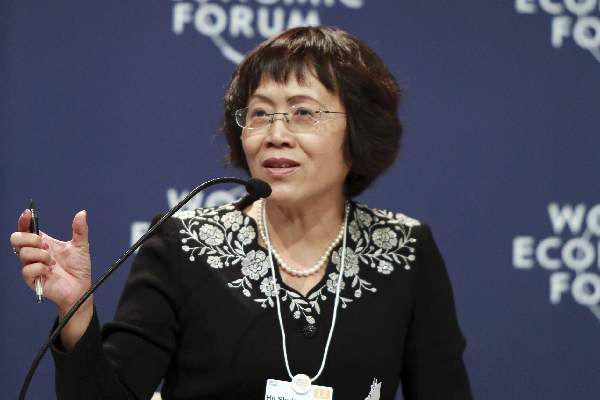Hu Shuli Biography: Story Of An Ink-Stained Maverick

Hu Shuli Biography. Image Source: Wikimedia Commons.
- Full Name Hu Shuli
- Age 72 yrs
- Birth Date November 29, 1953
- Country China
- Relationship Status Married
- Spouse Miao Di
- Nationality Chinese
- Profession Journalist
- Awards and honors World's Greatest Leaders
- Education Renmin University, Stanford University and Fordham University
In a media landscape dominated by state-owned newspapers and government censorship, one journalist stood out for her fearless commitment to independent reporting and investigative journalism.
The journalist’s name is Hu Shuli, and she is widely regarded as one of the most influential and respected journalists in China. Known as “the most dangerous woman in China,” Hu co-founded Caijing, the preeminent business magazine in China, and has been hailed for her audacious exposes of corruption and unethical business practices.
Join us as we explore the fascinating story of Hu Shuli biography, who has dedicated her career to pushing the boundaries of press freedom in China and advocating for independent journalism in a country where it is all too often under attack.
Early Life and Career: From Political Persecution to Journalism
Hu Shuli was born on November 29, 1953, in Beijing, China. Her father, Cao Qifeng, was a high-ranking official in the Chinese government, but he was persecuted during the Cultural Revolution, and the family was sent to live in rural China for many years.
After the Cultural Revolution, Hu was admitted to the People’s University of China, where she studied journalism. She began her career as a journalist at the Workers Daily newspaper, where she worked as an international editor and reporter. Her mother, Hu Lingsheng, was also the senior editor at the Workers Daily newspaper.
In 1992, Hu joined the China Business Times, where she became the chief reporter and international editor. She gained a reputation for her hard-hitting reporting and her coverage of China’s economic reforms.
Hu’s career took a new turn in 1998 when she founded Caijing Magazine. The magazine quickly gained a reputation for its independent reporting and investigative journalism, and it became one of the most influential business magazines in China.
The Birth of Caijing Magazine: Challenging the Status Quo
Hu Shuli founded Caijing Magazine in April 1998 with the backing of a group of US-educated Chinese businessmen. The magazine was launched during a time of rapid economic growth in China, and Hu saw an opportunity to provide in-depth coverage and analysis of China’s emerging market economy.
From the beginning, Caijing Magazine distinguished itself from other Chinese publications by its commitment to independent reporting and its willingness to challenge the status quo. The magazine’s investigative journalism and exposés of corruption and unethical business practices made it a thorn in the side of the Chinese government and powerful business interests.
Despite facing pressure from the government, Hu remained committed to pushing the boundaries of press freedom in China. She believed that a free press was essential for the development of a healthy and transparent business environment, and she saw Caijing Magazine as playing an important role in this process.
Under Hu’s leadership, Caijing Magazine became the preeminent business magazine in China, with a reputation for authoritative and exclusive reporting on economic and financial issues. The magazine’s influence and impact on public discourse in China were significant, and it helped to shape the development of China’s market economy in the early 21st century.
ALSO READ: Learn about the biography of Shonto Begay.
Investigative Journalism: Uncovering Corruption and Exposing Cover-Ups
Hu Shuli and her team of reporters at Caijing Magazine were known for their hard-hitting investigative journalism. They pursued stories that other Chinese media outlets were afraid to touch, and they exposed corruption and unethical business practices across various sectors of the economy.
One of Caijing Magazine‘s most notable investigations was its coverage of the fraudulent accounting practices at Yin Guangxia, a widely-traded company. The magazine’s reporting took massive market value in a short period of time and led to the arrest of those responsible for the fraud at Yinguangxia.
Caijing Magazine also covered the outbreak of SARS in China and was praised for its in-depth reporting on the crisis. The magazine’s reporting helped to expose the cover-up of the epidemic by the Chinese government, and it played an important role in bringing the crisis to the attention of the international community.

Hu Shuli Biography. Image Source: Wikimedia Commons.
Hu Shuli and her team received numerous awards and accolades for their investigative reporting, including being named International Editor of the Year by the World Press Review in 2003. Their reporting helped to expose corruption and promote transparency in China’s market economy.
Similarly, you would love to explore the biography of David Baszucki, the co-founder and CEO of Roblox.
Pushing the Boundaries of Press Freedom: Facing Government Pressure and Censorship
Despite its reputation for independent reporting, Caijing Magazine faced pressure from the Chinese government and powerful business interests. The magazine’s reporting on sensitive issues, such as corruption and human rights abuses, often put it at odds with the government’s propaganda machine.
In 2009, Hu Shuli resigned from Caijing Magazine after a dispute with the magazine’s owner over editorial independence. She went on to found a new media venture, Caixin Media, which included a new magazine, Caixin Weekly.
#China ’s ‘Most Dangerous Woman’ #HuShuli stepped down as the editor in chief of #Caixin Media to successor #WangShuo. pic.twitter.com/JwZTI1kMQe
— AllTechAsia (@alltechasianews) January 9, 2018
Caixin Media continued to push the boundaries of press freedom in China, and its reporting on sensitive issues, such as the 2011 Wenzhou train collision and the Chinese government’s response to the COVID-19 pandemic, drew praise for its independence and accuracy. However, the media organization has also faced censorship and government pressure.
Hu Shuli has remained a vocal advocate for press freedom in China and has called for greater transparency and accountability in the country’s media landscape. Her contributions to independent journalism in China have paved the way for other journalists and media organizations to challenge the status quo and promote transparency and accountability in China’s market economy.
Legacy and Impact: Hu Shuli’s Contributions to Chinese Journalism and Beyond
Hu Shuli biography resonates with the movement for freedom in Chinese journalism. Through her work at Caijing Magazine and Caixin Media, she has helped to shape public discourse on economic and financial issues in China and has advocated for greater transparency and accountability in the country’s market economy.

Hu Shuli Biography. Image Source: Wikimedia Commons.
Hu’s commitment to independent reporting and investigative journalism has inspired other journalists and media organizations in China to challenge the status quo and promote press freedom. Hu’s work has also had an impact beyond China’s borders, with her reporting on the global financial crisis and other international issues drawing attention to China’s role in the global economy.
In recognition of her contributions to journalism, Hu has received numerous awards and honors, including the Louis Lyons Award for Conscience and Integrity in Journalism from the Nieman Foundation for Journalism at Harvard University.
Hu Shuli biography as an ink-stained maverick and champion of press freedom in China will continue to inspire journalists and media organizations around the world for years to come.
Hu Shuli. (n.d.). Forbes.
sopasia.com. (n.d.). BIOGRAPHY Ms Shuli Hu
Hollar, S. (2009, January 28). Hu Shuli | Chinese journalist, editor & activist. Encyclopedia Britannica.
Hu, Shuli. (n.d.). The Ramon Magsaysay Award Foundation – Honoring Greatness of Spirit and Transformative Leadership in Asia.
Hu Shuli | United Way Worldwide. (n.d.). United Way.
Hu Shuli. (n.d.-b). World Economic Forum.
Did you notice an error ?
Please help us make corrections by submitting a suggestion. Your help is greatly appreciated!











